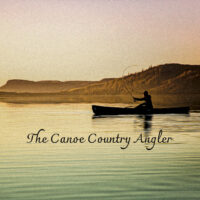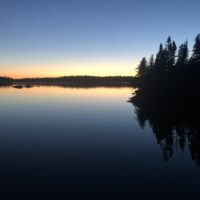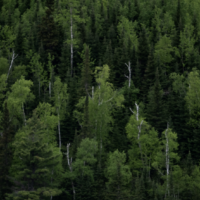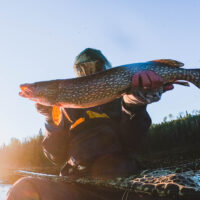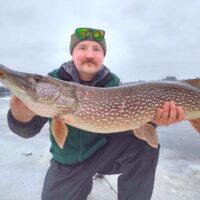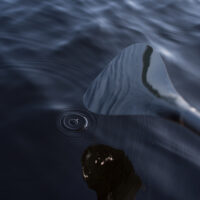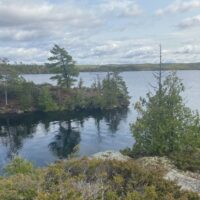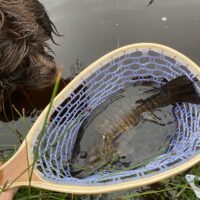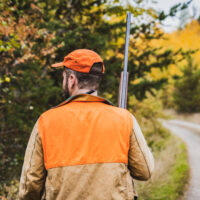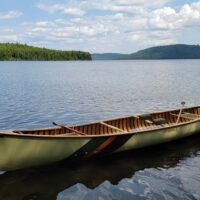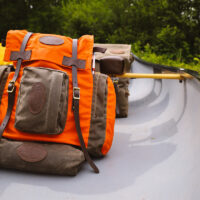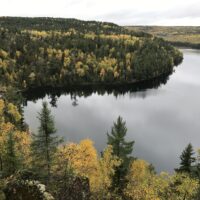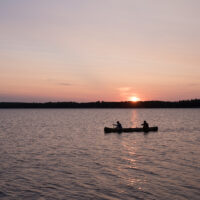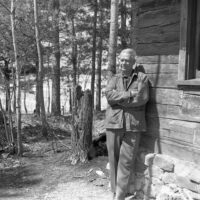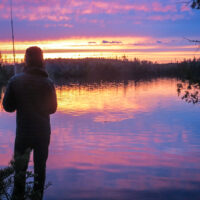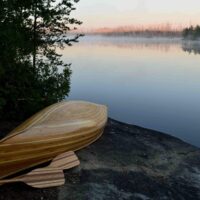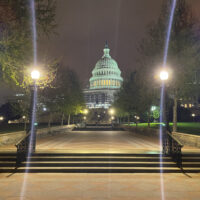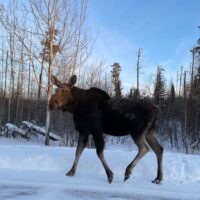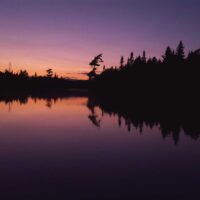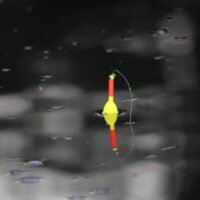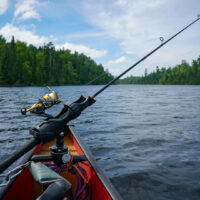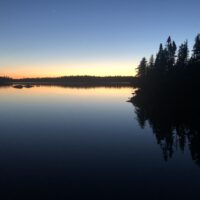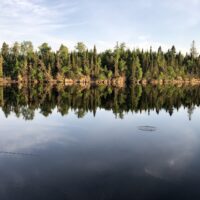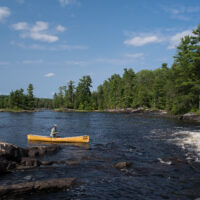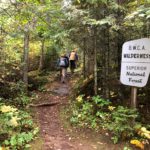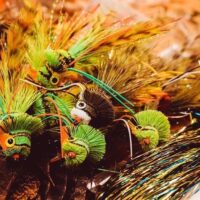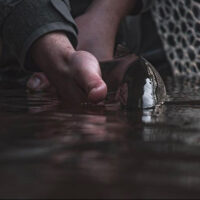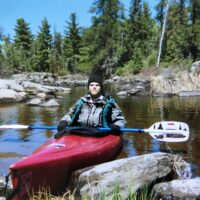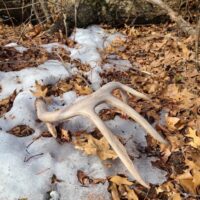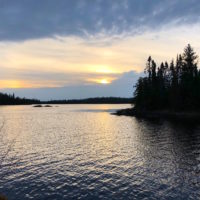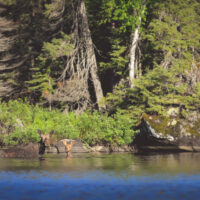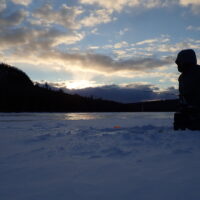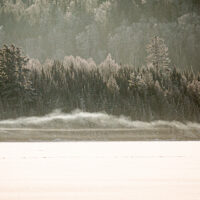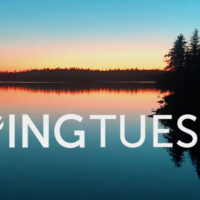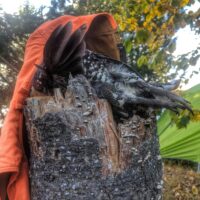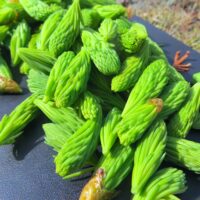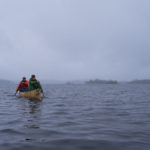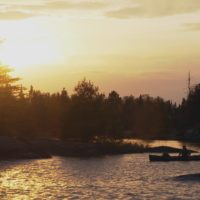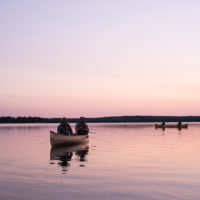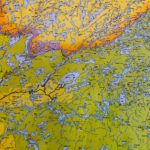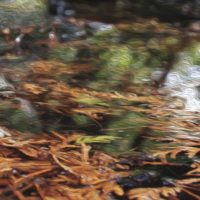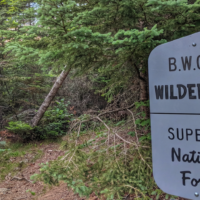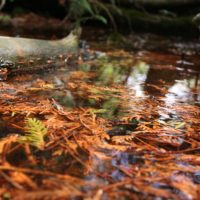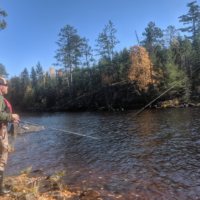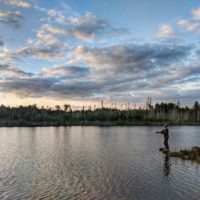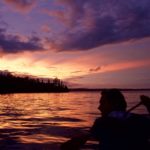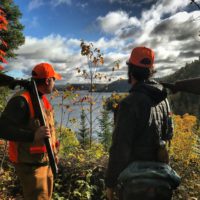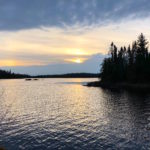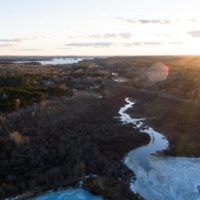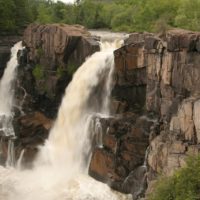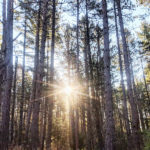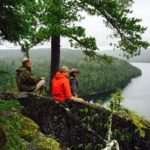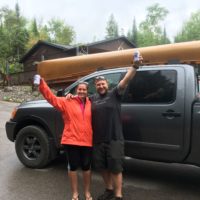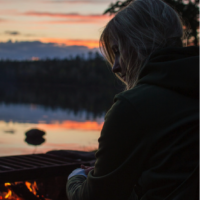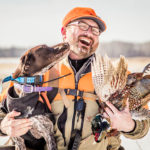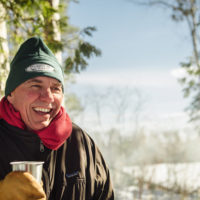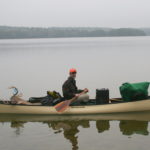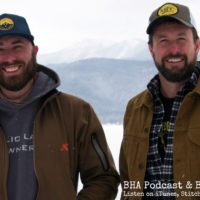Liquid Trailhead: Lake Three Solo
May 27, 2021 1:58 pmStory written by JD Fratzke
There’s no question that I was scared. I gave myself credit for hiding it well despite the fact no one was watching. The gravel lot at the end of the Fernberg (Access 30 on Fisher Map F-31) was empty save for a navy blue Chevy S-10 and a late model Four Runner. I had heaped my two packs, dry bag, kayak paddle, tent, sleeping bag, and self-inflating pad next to Red Medicine (my crimson-colored Old Town Loon 111) on the shore near the launch after hauling them two at a time from the trunk of my Jetta.
Carl, a childhood friend from Winona, ran the guide program at Canadian Border Outfitters on Moose Lake and had signed my permit for four days – Sunday through Wednesday – earlier that morning.
“Just you?” he’d asked, hunched over the glass case of bumper stickers, patches, and various spendy survival knives.
“Yeah. Two months ago, it was supposed to be seven of us. One by one, they bowed out. I’d already requested the time off, so…”
“Well,” Carl interjected, “weather shouldn’t be too bad. Supposed to get a little chilly Tuesday, but hey, it’s May. Fishing opener isn’t until next week, so you should have the place to yourself for the most part.”
Seeing as how it was my first solo trip and my first time in the Boundary Waters with my kayak, my affinity for the restorative powers of alone time was being hijacked by uncertainty. I had no idea how this was going to turn out. Solitude has never been a problem for me, but having been raised on an Uncle’s tales of having barely survived the infamous Armistice Day Storm of 1940, or hearing about a high school friend who died of hypothermia in an Alaskan lake, I knew that a few minutes of inattention, a fickle change of Mother Nature’s mood, or a poorly curated gear list could quickly turn me into a floating chef-sicle.
I was up for the challenge of a solo trip. It was why I had saved for years to buy a kayak in the first place. As for the rest, I knew how to start a fire and set up a tent. My map-reading skills were nominal at best, and I was well aware that the water temperature two weeks after ice-out was in the suck-the-air-out-of-your-lungs, hypothermic range. On the second morning of my first trip to the Boundary Waters, the year previous, my camp-mates dog had rolled their canoe thirty yards from shore four days after ice-out. When he made shore, stripped to his skivvies, and started running in place, we saw that the five or so minutes he spent in the water had turned his entire body bubblegum pink.
As such, ten days before my time off kicked in, I spread a blanket out on the floor of my basement and began arranging all of the gear I would bring with me on the trip – anticipating damn near everything from white-out conditions to a combined assault on my campsite by deviant wolverines or the last short-faced bear to survive the Clovis expansion into the Great Lakes region. My line cook DNA ran into overdrive as I scratched out several lists of what I had versus what I needed versus what would be a good idea to take along just in case. I began to beg, borrow and steal to tick them off.
I presented my uncertainties to Art, the curmudgeonly Cantonese-born Chef de Cuisine I worked with at Chino Latino, whose chief hobby – outside of playing tug of war with a four and a half foot tall Ecuadorian woman over control of our prep staff – was racing jet skis on a semi-pro circuit. He offered to loan me one of his old wetsuits. I nearly wept with gratitude until he brought them to work the following day. They were garishly splashed in Zubaz-like dayglow colors and would have turned heads on a Mardis Gras float.
“Jesus. Are these meant to be seen from space?” I asked.
“Just wear ‘em around the camp as wolf repellent,” Art cackled.
“You’re not wrong. No self-respecting alpha predator would eat anything this ugly.”
“Remember, though,” He continued soberly, ”If you dump in water that cold, yer still gonna feel the shock. It’s gonna be hard, but stay calm and stay with your boat. Just work to try and control your breathing and remember that your body temperature will heat the water that fills the suit… Eventually… If you keep moving… And trust your PFD. Don’t even think about paddling without one.”
If I keep moving. Right. Movement wasn’t exactly easy in what felt like a half-inch thick full-body speedo, but it gave me confidence against an accident or a mistake, and for that, I was thankful. I recalled his wisdom as I paddled farther and farther away from the put-in on a crisp and blue mid-May afternoon, trying to match the map in the waterproof sleeve strapped to my spray skirt with the sky-climbing pines and primordial rock of the v-shaped gorge that opened up to the vast, clear, ancient waters of Lake One. I was so terrified of getting lost that I triangulated my position all afternoon, affirming every campsite on the map until I had beached on the red dot I told Carl I would use as my home base; an island on the south bay of Lake Three.
I set up my tent right away, clipping the rainfly to the frame, and got a fire going. I made tea, laid out my mess kit, and took a quick inventory of the four days of food I’d brought for myself. I’d already decided that I would cap off my first solo night in Voyageur country with a hearty Alsatian treat of lentils and sausage.
First thing first, layer by layer, I stripped naked to get the damn wetsuit off. I replaced the neon blue and hot pink neoprene with old school woolen long johns, fatigue pants, and a ratty green fleece. I then set off to gather firewood. Using my kayak paddle as a cutting board, I whittled carrot, celery and onions into the Gallic trinity and smashed a few garlic cloves, then swept them into my saucepan with a chunk of butter and a dusting of dried thyme. The aroma rose slowly, that green, musty citrus of thyme whirling into woodsmoke and the unmistakable heartwarming smell of mirepoix and butter coming to life. Setting a kielbasa from Everett’s to sizzle on the grill, I stirred dried lentils and a few chunks of braunschweiger into the pot and topped it off with water and a splash of white wine I had brought in a tiki-shaped Nalgene. My lentil and sausage stew was almost complete. I realized my hands were getting chilly and looked up from the coals of the fire to see the sky was splashed with the same colors — a brilliant riot of pink, white, and orange dipping into the black pine spires across the lake. Right on cue, the loons sounded off. It hit me like a fallen limb. I was alone in the Boundary Waters Canoe Area Wilderness. I hadn’t seen another human being all day. Night was falling, and I was making myself a private feast. How many people in human history had felt like this? Medieval travelers… Anishinaabe traders… messengers… abandoned explorers… brigands… I’d put myself in an exclusive company.
Slipping the pot to a cooler spot of the grill, I walked to the lake, crouched, cupped the water in my hands, and brought it to my head, neck, and face as a sort of self-administered baptism. I mumbled an ad hoc prayer of gratitude, bowed to the four directions, and asked all the spirits and all my ancestors, my grandfather in particular, for protection and safety.
When the lentils were done, I added the sliced kielbasa and three packages of Dijon I’d jacked from the freebies at the grocery store sandwich counter. As I dipped into my dinner, I smiled for a moment, wondering if I were the first person to bring a Grey Kunz spoon into the BWCA. A chill breeze reared up from the shore, and I imagined the ghost of a hairy, aromatic Voyageur staring at me from across the fire with stew dripping down his beard, sharing my meal and grunting, “C’est bon, Ami. Like mon Maman made back home on the farm in Quebec…”
I sipped at the white wine, but it didn’t agree with me, so I brewed another cup of tea and munched a chocolate chip granola bar for dessert. I had thought that I would want to spend the night reading by the fire, but that desire never presented itself. Instead, I stared into the coals, feeding them intermittently, hyperaware of the silence that was only interrupted by the hiss of damp deadfall resisting the hunger of the meager flames, a rustle in the woods, or a pair of loons.
After scouring the campsite by headlamp for anything that might invite the curiosity of a black bear, I stuffed my remaining food and cook set into a red mesh bag, tied the end to a length of parachute cord and hoisted it into high branches of a ratty tamarack. I rinsed off my hands in the lake, crawled into my tent, and peeled down my layers to long johns. Noticing a puff of breath in my headlamp, I put my fleece back on, zipped into my mummy bag, and fell into a sleep so deep it out-ran dreams.
I woke to a steady patter on my rainfly and an occasional violent gust trying to turn it into a sailcloth. The tent was cold, and everything was clammy to the touch. Hunched over, half in and half out of my sleeping bag, I tried to dress, steeling myself to head into the squall for a morning pee. I couldn’t seem to warm up.
The firepit was in a wooded spot with overhanging branches and the ashes still looked dry. A pass of my hand over the coal bed felt warm, so I went back to the tent to put on my plastic poncho and rip a few pages from my journal. Working under the insistence of some spotty raindrops, after a few tries, I got the fire going again. The sky was an even gray, and the lake looked black, rife with whitecaps whipped up by winds that by the minute seemed to come stronger and more often towards an invisible bullseye painted on my tent. I stoked the struggling fire as high as I could, but the nasty drizzle that was fast becoming actual rain began soaking into the pile of branches I had stacked the night before. Piling spruce branches on the grate over the fire to keep the rain from dousing it, I plodded back into the trees with my hatchet, looking for any wood that appeared pale and dry. I hadn’t yet learned to look at eye level for leaning deadfall, so most of the stuff I grabbed crumbled like tres leches when I tugged at it. Eventually, I managed a heavy armful and sat down to stoke the coals struggling to breathe in the firepit. By the time I had actual flames rising on their own, the drizzle that had turned to rain was a full-on, bone-chilling downpour. My pants and boots were soaked, and the joints in my fingers hurt the way they did when I cleaned shrimp in ice water at the restaurant. I slipped my poncho over my head and spread it over what was left of the wood I had gathered, then weighed it down with a couple of rocks in hopes that when the weather passed, there would be an amount of kindling dry enough to get some kind of fire going. The lake was getting violent, with real breakers hitting the rocks on the landing. I dragged my kayak all the way up to the campsite, imagining the nightmare scenario of a rogue wave pulling it into the lake while I huddled clueless in my tent. Almost as an afterthought, I pulled the wetsuit from the branch where I’d hung it, not wanting the wind to carry it away. (I imagined Art offering me a payment plan to replace it: “Well, we could do like fifty a month for six months, but if twenty bucks a week works better for you…”) I crawled back in my tent and rummaged in the bottom of my pack for the spare clothes I had wrapped up in a Hefty bag. I stripped, re-dressed in the dry stuff, and slipped into my sleeping bag. “May, my ass,” I grumbled, literally curling into a fetal position, “Mother Nature, I’m having a hard time wishing you Happy Mother’s Day.”
I spent the next eighteen hours in my tent, the frame and rainfly ripped at constantly by fangs of wind that seemed to want to lift and shake me like a ratty chew toy. I tried to read to keep calm reading an Outside Magazine or the Tolkein I’d brought as morale boosters – but I realized I was getting too cold to focus, even in my sleeping bag, even with my coat on. I took a sip from the remaining wine in my Nalgene, but it tasted like battery acid, so I dumped it on the ground outside my vestibule (to this day, I never bring alcohol with me on any wilderness solo trips). I considered the remaining layers squirreled away in the bottom of my pack, wrapped in a plastic garbage bag for emergencies, then looked at the dayglo abomination wadded in the corner near my boots. I took deep breaths and as quickly as possible, stripped naked, pulled on Art’s neoprene wetsuit one more time, and carefully re-dressed in the same layers, including the poly long-johns and baselayer shirt, zipping up and buttoning up in turn, then crawled back into my mummy bag – warmer, but feeling as if I was wearing bubble wrap.
With what had amounted to a full-fledged storm ripping through my campsite, I didn’t have much choice but to hunker down. I pulled one of the garbage bags with dry clothes from my pack to use as a pillow, pulled it into the sleeping bag with me, and zipped myself in. I wasn’t particularly tired, but all I wanted to do was ride out the weather in my sleep. I dozed off for what may have been an hour. I had a digital watch, but it was in my pack, unretrieved. I didn’t want to add the tyranny of time to my tent sentence. Mother Nature, I was learning, didn’t give a damn about where I wanted to be or when. The sleep had been far from restful, and I was cold again when I woke up. Desperate, I did what everyone tells you not to do and fired up my Coleman Propane burner in the tent. Even with rain still coming down, and violent winds whipping the rainfly, the tent began to warm up. To my slight relief, so did I.
I became comfortable enough to sit up and read again for a while, and I noticed that I could hear the squalls long before they pummeled my tent – a distinct, low rumbling sound, like distant thunder or a train – would rise and fall before my rainfly was bombed with a gust. The sound of wind ripped through trees at the top end of the lake, as if to warn me. I somehow took slight comfort, the dull roar from the north seeming to call out, “Hunker down, boy, here comes another volley.”
That discovery might have been elementary, and I’d been out in cold, lousy weather before (in a tree stand, duck hunting in the river bottoms), but this was the first time I was alone in true wilderness. I wasn’t following anyone’s lead or benefiting from their experience. I was by myself now.
Back home in Winona County, a warm Ford pickup truck and a trip to the nearest bar and grill was at most a ten-minute slog or boat ride away. As it stood, I was two portages and five miles as the crow flies from where I’d parked my Jetta in the lot at the end of the Fernberg Trail. The waves breaking on the island where I was camping were rolling a couple of feet high, driven by what would be a vicious, impossible headwind. Even with the wetsuit, I didn’t have enough confidence in my paddling skills to entertain giving it a try. Wrapping up and calling it a day wasn’t an option. I had made my bed and had to lie in it.
Dusk falling, when it arrived, was noticeable. Though I had struggled into the neoprene monstrosity earlier that morning, my most strenuous activity of the day had been to pee, on my knees, out of the tent vestibule. When darkness finally came, I went out like a light.
When I woke up, winds were still shaking my rainfly, but with nowhere near the fury of the previous day. It was light out, and I finally dug the watch out of my day pack. It was just after seven AM. If daylight wakes me when I’m camping, I always hear the voice of Nobody, Gary Farmer’s character in the Jim Jarmusch cinematic masterpiece DEAD MAN:
“Don’t let the sun burn a hole in your ass, William Blake…”
My gear was still damp, and everything was cold to the touch, but I knew I needed to get the lay of the land, take a leak, and grab an energy bar from my food bag – if it was still there. I unzipped my rain fly and got ready to be cold.
Snow. It was snowing. Everything I could see, save the lake and its whitecaps, laid coated under an inch of snow.
Part of me wanted to cry. I had planned for another night, a loop through Hudson and up to Fire Lake, then down again to Four, another camp and a long day’s paddle out. The wind, though less aggressive, was still kicking rollers out on the lake. There were enough white caps that it looked, as the Inuit say, there were ‘sheep out walking.’
I stood there for a moment, taking it all in, miserable at the prospect of another day spent trying to keep warm in the tent. Sure, I had relatively dry paper in my gear, and I had covered the firewood with my tarp, but the wind was still blowing, and all of that wood was forest-floor damp anyway. I had no idea if another front was going to blow in and if it would be as bad or worse than what I had huddled through the day before.
Finally, I shook my head and laughed, thinking, “I really love it here, and I like being outside, but this is dumb.”
It took me about fifteen minutes to break camp, doing nothing meticulously. The only piece of gear I rolled up and stowed in its proper vessel was my inflatable sleeping pad – and that was out of necessity. Though the snow had dropped off to flurries, the wind still blew cold. I moved quickly to keep warm and get the job done, but more out of concern for making what might be only a short break in the weather. The only things I didn’t stow in a pack or dry bag were my map, water bottle, a couple of energy bars, compass, and binoculars – all of which found a home in various compartments of my life vest. I put my watch on my wrist before I pulled on my neoprene gloves. A multitool and click stick lighter were zipped in the cargo pocket of my fatigue pants. If the waves dumped me out of my kayak and I lost my gear, I would, like Art had instructed, do my best to stay calm and trust that my PFD would get me to shore and that the lighter could get a fire started.
I knocked the crust of snow off the hull of my Red Medicine, rolled her over and stuffed her to the gills. I scanned the campsite once more, to be sure I hadn’t left an errant Nalgene or length of parachute cord that I would later regret having forgotten. Seeing nothing, I sat in my kayak seat, zipped myself into the spray skirt, and used my paddle to push away from the lichen rocks of my island and into the gray waves of Lake Three.
Kayaking on open water in heavy weather requires all of one’s concentration, especially in a headwind, which does its damnedest to turn you and your boat sideways and roll you over. Winds and cold water are predatory companions that hunt in tandem to consume paddlers. Because you need to propel your boat through the waves by paddling the entire time, stopping to pull out a compass and check it against your map results in an immediate loss of control and begs disaster. To combat this, dead reckoning (using a fixed point on the horizon to track direction and establish location) is needed to keep the prow of your kayak moving toward a waypoint.
What makes dead reckoning difficult in lake country is the lack of any real elevation. Some trees are taller than others, yes, but ‘high points’ in the Boundary Waters are a rarity. There isn’t a lot of real terrain. As a result, the tall tree a mile distant that you select as a waypoint looks a hell of a lot like the one forty yards to the left or right of it. Shifting your eyes from said tree to the sets of breakers rolling toward your prow, even for a second, almost guarantees that when you look back up to find that tree, it could be any of the dozens in front of you. Couple that with the fact that on a cloudy day, aside from a few seams of birch, the horizon of trees is a single, dark, green-black mass. Depth perception, especially for someone who’s eyesight is as poor as mine and who’s glasses are spattered with rain, like mine were, is difficult to discern. What looks like the bend in the lake taking you to a portage turns out to be the mouth of a creek. A speck of island becomes a peninsula and vice versa.
In short, without sun in the sky and unable to use my map and compass to triangulate my location against designated campsites (like I had done on my way in), within an hour, I was lost. I staved off real panic by reminding myself that I still had another full day before I was due to call Lisa from Ely and let her know I was on my way home. Even if I couldn’t find a Forest Service spot before nightfall, I could make a safe camp somewhere and start again the next morning.
I paddled for a little bay on the lee side of a rock outcrop and bobbed in calmer water while I drained half of my water bottle and made breakfast of a peanut butter brownie Cliff Bar. Even though a good deal of my anxiety was circumstantial, I couldn’t help but hear the incessant teasing I’d put up with from my Dad and my cousins when I was a kid regarding my poor sense of direction. I hated not knowing where I was or the direction in which I was going. Not having read him yet, I hadn’t learned to embrace the Jim Harrison philosophy that “I wasn’t lost, I just misplaced my car for several hours.” As I came to grips with the fact that at least I had made a solid plan for a bad case scenario – and that was something – I realized that the curious sensation of warmth soaking into my gloves was sunshine.
Though there was still a prevailing wind from the northwest, the weather was beginning to break. Clouds gave way to patches of sky bright enough for me to dig in the daypack between my knees for my sunglasses. A little more confident, I gripped my paddle again and headed back around the outcrop and into the lake. The rollers and whitecaps were fading, and the sun-dappled the stands of trees a little less than a mile away, finally making their distance discernable. By the time I reached the far shore, the water was calm enough for me to start using my map and compass, though they were of minimal help, not knowing where I was starting.
I began the tedious work of hunting for campsites using my watch, the sun, and the compass to get my best bearings. Finally, I spotted what I hoped was an island in Lake Two that had a campsite on the northeast corner. Coming around the bend, I saw several tents, a roaring campfire, and three upturned canoes. As I paddled toward the camp, a rogue squall blew in and stirred up shouts, bits of gear cycloning in the gust as guys in primary-colored rain gear leaped from the coolers they’d been sitting on to snatch what they could. A hat sailed toward me like an errant gull and sank when the breeze died, splashing into the lake just a few feet from my boat. I snagged it with the blade of my paddle, laid it on my prow, and then paddled toward their camp.
A guy about my age and twice my size, thick and broad-shouldered, picked his way down the bank as I bumped into shore. I passed him the soaked hat, powder blue and boonie-style, with the name and logo of a casino stitched above the brim, from the edge of my paddle. He reached out for it.
“Hey, thanks, man,” he said cooly. He reminded me of a young Matt Birk, the Vikings star center who owned a couple of restaurants in the cities.
“No sweat. How long you guys been here?”
“Just this morning. You heading back?”
“Yup.” I asked.
“You solo?”
“Yeah.”
“Did you have bad weather yesterday? We saw storms and snow in the forecast.”
“Yeah. I wish I had paid more attention to that,” I admitted. “I spent eighteen hours in my tent.”
He closed his eyes and shook his head, bewildered, “That doesn’t sound like any fun.”
“Coulda been a lot worse. Thank god for rain flys,” I smirked.
“I’ll bet.” He stood up from his crouch and made to move on.
“Hey,” I ventured, reaching into my PDF for the map, “I kinda got blown off course this morning.”
He returned to his crouch and shifted toward me.
“Could you show me which campsite you guys are at?” I asked, trying to sound like, you know, I was just checking.
“Yeah, sure,” he lit up, seemingly glad to help, “we meant to get back into Four, then tomorrow to Insula – get a good camp ahead of fishing opener – but the waves this morning were a bitch. We decided not to take any chances. We’re right here.”
He pointed to the elbow of a peninsula on Lake Two, half a mile southeast of the island on which I thought they were camped.
“Okay. Yeah, I thought that’s where we were,” I lied, “Just wanted to make sure before I got turned around.”
“Awright, then. Good luck. Thanks again, buddy!” he cried, turning around to his campmates and holding the hat high.
“Likewise,” I returned, relieved to know, at last, where I was headed.
I back-paddled and headed north-northwest, dreaming of scrambled eggs, bacon, and wheat toast soaked in warm butter.
Heading out of the parking lot at the Lake One put-in, I decided to turn right on CBO road and let Carl know that I was coming out a day early. It was a little after one in the afternoon and I was hoping he could tell me if anyone was still serving breakfast food in Ely.
“Weren’t you coming out Wednesday?” he asked.
“Yeah, but after the storm, spending a full day in my tent, then waking up to snow this morning… I called it early.”
“Yeah. You’ll have that,” Carl said, glancing out at the mirror glass of Moose Lake, “You got a storm, huh? We had rain yesterday and a little wind. Snow was all gone by about eight or nine this morning…”
Carl had been guiding rubes from Kansas City to Singapore all over the BWCAW and Quetico – winter, spring, summer and fall – for over five years. It was going to take more than a chilly night in a tent to bend his ear.
He jingled his keys in his hand, “I gotta head into town, anyway. I’ll grab lunch withya.”
“Mind if I quick use your phone to call Lisa?”
“Knock yerself out. My truck’s in the lot. Meetchya there.”
The phone call went to voicemail so I left a message, thanked Carl’s wife, Lori, and went to meet him up the drive. I followed Carl to a bar and grill, no scrambled eggs on the menu, settling for a bacon cheeseburger and a pint of local porter instead.
Re-entry felt strange, off-balance. I found it difficult to reconcile the fact that only a few hours earlier I was without a map on a wilderness lake and uncertain of when or how I would make it home. But I had – back to the Ely trailhead, anyway – and I had cheeseburger juice and mayonnaise in my beard to prove it.
There were a lot of things that went wrong and even more that could have gone wrong and didn’t. Going solo, as a rule, was a huge risk – one I tried to mitigate by hunkering down when I had to and moving when the time seemed right. I definitely pushed a few limits, on my rainfly for one (I resolved to write the good people at Kelty a hearty and sincere email of gratitude when I made it back to the basement computer in Minneapolis) and on my knowledge for another. After all, I had found solutions to the things that went south – even if they weren’t comfortable ones. I knew that if I chose to, I could do it again and with a lot more confidence.
Carl and I parted with a handshake, and I gassed up the Jetta at the BP on Central Avenue. As I throttled up on Highway 1 west past Burntside, a red fox, indifferent to German automobile engineering, trotted across the asphalt a few dozen yards in front of me, his nose up, solo, surviving.
 JD Fratzke is a fourth-generation native of Winona, Minnesota and has been an award-winning hospitality professional for over three decades. In addition to his leadership roles in establishments such as Chino Latino, The Strip Club Meat & Fish and Falls Landing, JD has contributed to the culinary programs for over a dozen establishments in greater Minnesota and appeared as a judge and mentor in season sixteen of BravoTV’s reality show Top Chef.
JD Fratzke is a fourth-generation native of Winona, Minnesota and has been an award-winning hospitality professional for over three decades. In addition to his leadership roles in establishments such as Chino Latino, The Strip Club Meat & Fish and Falls Landing, JD has contributed to the culinary programs for over a dozen establishments in greater Minnesota and appeared as a judge and mentor in season sixteen of BravoTV’s reality show Top Chef.
An avid kayaker, outdoorsman and wilderness advocate, JD’s writing has appeared in the Saint Paul Pioneer Press, The Growler and the anthology Under Purple Skies (Belt Publishing 2019).
JD Fratzke lives in Minneapolis with his wife and daughter.
Tags: Boundary Waters, boundary waters canoe area wilderness, BWCA, fishing opener, kayaking, solo canoeing, wilderness

